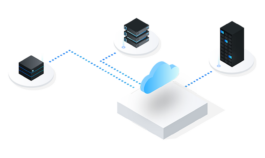Orange Shirt Day: Raising awareness and healing

It’s a challenge to summarize in a blog the lasting impact that the residential school system has had on Indigenous families. Many Canadians now show their support for Orange Shirt Day, which takes place on September 30 as a way to shed light on the impact residential schools had on the lives of the Indigenous community. But what we’ve often realized in our interactions with friends, colleagues and in the public discourse is that many people aren’t fully aware of the meaning of Orange Shirt Day.
The tradition of wearing orange stems from the experience of Phyllis Webstad, who wore an orange shirt to a residential school back in 1973. The 6-year-old was forced to remove her shirt and replace it with a school uniform. Today, wearing orange represents a way for survivors of the residential school system and their families to share our stories — oftentimes plagued with feelings of being undervalued, or experiences of being mistreated or abused.
The trauma and lasting effects of residential schools can be seen generations later, as younger Indigenous Canadians try to heal from the psychological and sometimes physical abuse our parents and grandparents went through. Some of the impacts of this abuse include health problems, mortality and suicide rates, substance abuse, criminal activity, and fragmentation of families.
This is why it’s important to come together as Canadians to recognize and honour survivors of the residential school system.

What businesses can do
First and foremost, it’s essential that businesses celebrate diversity and inclusion.
At IBM, diversity and inclusion are part of our workplace culture and can be seen through our many business resources groups (BRGs). These are volunteer, employee-led groups that honour different assemblies of people. They also provide employees with support and enhance career and personal development within the workplace.
Second, we can see how access to resources and education in the tech industry can greatly differ between advantaged and disadvantaged populations. As a result, many Indigenous youth, particularly in remote regions of Canada, will not have the same career and economic opportunities that others do.
At IBM, we’re currently approaching our one-year anniversary of offering the P-TECH School Model (Pathways in Technology, Early College High School) through Six Nations Polytechnic’s (SNP) STEAM Academy, together with Mohawk College in Brantford, Ontario. STEAM stands for Science, Technology, Engineering, Arts, Mathematics.
With PTECH, IBM is helping regional economies become better prepared for skilled tech positions by enabling students at SNP to graduate with a high school diploma; a tuition-free, industry aligned two-year college diploma, and workplace experiences within six years or less.
Taking action
Issues of race and justice are at the forefront of the national and international conversation. We are at a moment in history where we can truly come together as Canadians to help make lasting, positive change through education and ongoing dialogue.
For those of us within the Indigenous community, this means continuing to share our stories. We’re here to remind you that you’re not alone and that the pain that has been inflicted is the result of generations of suffering. While that does not justify the hurt and discrimination we may face, there are steps we can take to break the cycles of systemic racism. Let’s raise our hands and get involved in community initiatives, advocate through political systems or simply let others know we’re Indigenous and be proud to talk about what that means to us.
For those who are not Indigenous, your support and allyship is needed — not just on Orange Shirt Day, but every day. In the spirit of reconciliation and as advocates of the Indigenous community, we ask you to help us raise awareness of our collective Canadian history and demonstrate through action that we’re all equals. By celebrating our traditions and taking the time to understand our history, you’ll be helping to make positive progress.
Perhaps you’ve been a passive supporter to date, but you want to learn more. Perhaps you want to get involved in making real change. Our hope is that you choose this year’s Orange Shirt Day to lean in and learn from your Indigenous colleagues, friends and thought leaders about what this day really means to us.
If you want to learn more about Orange Shirt Day or get involved, please visit https://www.orangeshirtday.org/

Tammy Foster
IPNG BRG Co-Chair and Customer Relationship Manager, Client Support Services
IBM Systems Supply Chain

Starrlee DeGrace
Digital Development Representative, IBM Cloud
IBM Digital Sales


